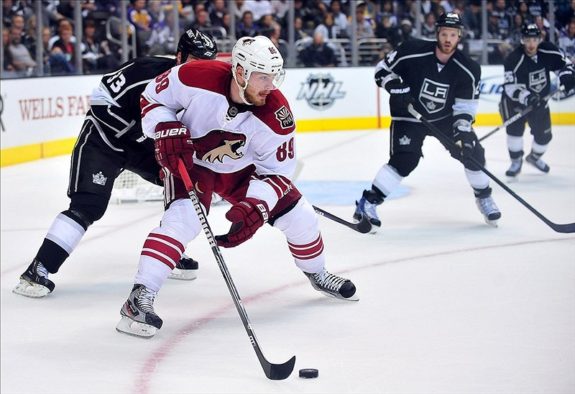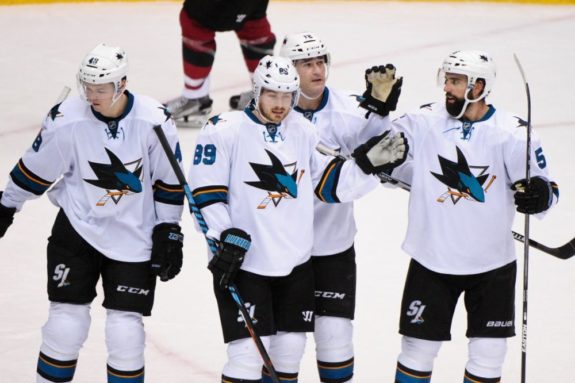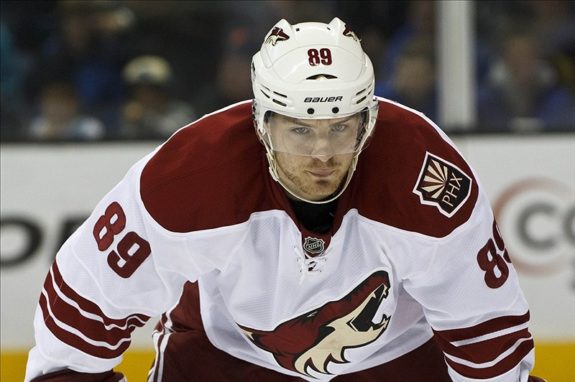When the San Jose Sharks acquired Mikkel Boedker as an unrestricted free agent in 2016, it looked like they had addressed their need for secondary scoring on the power play. After a not particularly close Stanley Cup Final series against the Pittsburgh Penguins in which the Sharks managed only eight goals in six games, general manager Doug Wilson did his job in the offseason by signing the plucky Dane to a four-year, $16 million deal. While not all of Boedker’s dip in production can be attributed to usage and luck, statistical regression and a new glaring hole at left wing point to a bounce back season for the former Arizona Coyote in 2017-18.
Not the Strongest Start
Before making his debut in sunny California, Boedker had spent almost his entire career with the team that drafted him eighth overall in 2008, the then-Phoenix Coyotes. After being shipped out at the trade deadline in 2016 to a Colorado Avalanche team clawing at the door to a Stanley Cup playoff berth that proved just out of reach, Boedker left money and term on the table to sign a four-year contract with the Sharks in order to play for what he and most of the hockey world saw as a Stanley Cup competitor for the 2016-17 season.
It may seem overly generous to use the word “disappointment” when referring to Boedker’s first season as a Shark. It may be more apt to use the word “disaster.” Boedker struggled to meet expectations: his ten goals placed him seventh on the team, and his 26 points in 81 games tied him with Paul Martin, a man not known for his offensive prowess. Compared with figures from earlier in Boedker’s career, the lack of production is stark. Boedker’s 26 points were his lowest in a season since 2011-12. Not his lowest in a full, 82-game season, as Boedker’s 2016-17 campaign tied his points production from the partially locked out 2011-12 season in which he played the full 48 games. Part of this decline is due to a lack of opportunity, as Boedker played almost three minutes less per game, on average, than he did in 2015-16, but there’s more to it.

Boedker’s points per game average last season was his second worst in the entirety of his nine-year NHL career, but there are positive dots in this tragic plot. For instance, many of Boedker’s possession stats saw an uptick in San Jose, where his on ice Corsi for percentage increased from 45.61 in 2015-16 to a much more respectable 49.48. While some of this is due to San Jose being a more effective puck possession team than either Arizona or Colorado (not a high bar), Boedker’s Corsi relative, at minus-2.15, was closer to his team’s average than it had been in all but one of his past five seasons in the desert.
Power Play Production Tanks at the Tank
Boedker scored 51 points in two of his past three seasons with the Coyotes. The 2014-15 season saw Boedker put up only 28 points in 45 game, missing significant time with a ruptured spleen, pretty good excuse, so we’ll rule it out for the sake of comparisons. One of the key arguments made by Boedker’s detractors when he was signed, and even when he was traded to Colorado, was that a preponderance of his production was on the man advantage. Indeed, Boedker tallied 16 power play points in 2013-14, and 19 in 2015-16, leaving only 30 and 24 even strength points, respectively, to his name. These numbers scale much more reasonably with the 22 even strength points Boedker posted in 2016-17 with San Jose.
Defenders of Boedker’s signing in 2016 pointed to his power play production as a good thing, not a warning sign. They argued (okay, we argued) that Boedker could shore up production on a second power play unit that struggled over the course of the season and present a more balanced man advantage attack. This was not the case. Far from it, in fact: after scoring at least 15 power play points in the aforementioned two full seasons, Boedker managed only one lonely power play point in 2016-17. Se an assist on a David Schlemko goal in Montreal. A drop that precipitous is more than the normal variance, and there are a number of factors to take into consideration when assessing future performance.

While it’s difficult to determine whether Boedker’s lack of production was cause or effect, the Sharks’ power play performance as a whole in 2016-17 was horrendous. San Jose’s man advantage stumbled through the year at a 16.7 percent efficiency, sandwiched between known scoring powerhouses the Florida Panthers and the now Boedker-less Arizona Coyotes at 25th place in the league. By contrast, as Mikkel Boedker is concerned, the 2015-16 and 2013-14 Arizona Coyotes cruised along at 17.7 and 19.5 percent, respectively, good enough for 20th and sixth place those seasons.
Disappointment By Committee
A number of factors could be in play for this decline: a lack of creativity on the man advantage causing one too many Brent Burns point shots to be blocked, a league second-worst power play shooting percentage of 9.79, or an astrological conspiracy due to Jupiter’s connection with Neptune, that’s a subject for a later investigation. No matter the cause, a series of external factors unlikely to repeat were at play in Boedker’s power play drought.
The decline from previous seasons goes past point production. The Sharks’ power play shooting percentage, while already 29th in the league, was even lower while Boedker was on the ice, checking in at 6.48 percent. This figure is third worst on the Sharks and 20th worst of 356 players in the entire league. The fact that there are three Sharks in that bottom 20 should explain away some of our power play concerns, but it’s clear that Boedker had some unsustainably terrible puck luck on the power play this season, and should increase his production if only by regression to the mean.

Opportunity Knocks
Luckily, pun intended, regression is not the only opportunity Boedker’s feet this coming season. With the departure of local legend Patrick Marleau, the Sharks have a gap at left wing that will need to be filled. Boedker is almost guaranteed more ice time with such a massive hole in the lineup, likely ameliorating some of the effects of his decline in overall usage. Afte Wilson made it clear that the Sharks are unlikely to sign any more free agents, Boedker should only have to face internal competition for a spot on the second line or, more importantly, first power play.
Without a Tomas Vanek or a Jaromir Jagr looking over his shoulder, Boedker will probably be competing with fellow left wings Melker Karlsson and Joonas Donskoi for that spot. So don’t worry, if he can get to the front of the net where he’s scored the majority of his goals thus far, and try not to walk under any ladders on the way to the rink in the morning, Boedker’s bounce back bonanza is all but assured.